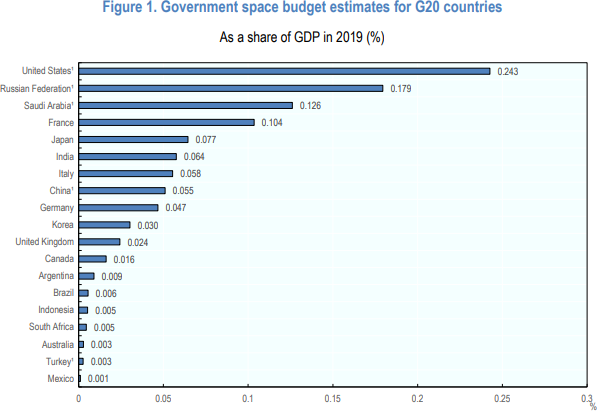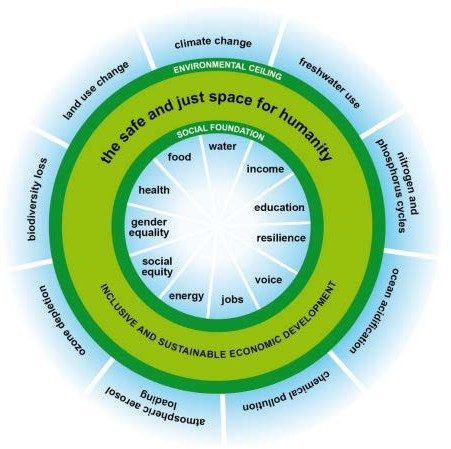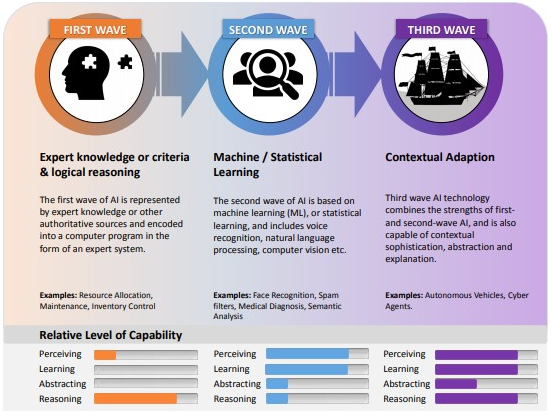eISSN: 2574-8092


Mini Review Volume 7 Issue 3
Fundación Universitaria Juan de Castellanos, Tunja-Colombia
Correspondence: Édgar Giovanni Rodríguez Cuberos, Fundación Universitaria Juan de Castellanos, Tunja-Colombia
Received: March 26, 2021 | Published: October 13, 2021
Citation: Cuberos EGR. Colonization of the space: artificial intelligence and robotics can contribute to a new form of ethical regulation in the space economy? Int Robot Automat J. 2021;7(3):78-82. DOI: 10.15406/iratj.2021.07.00230
This miniscript seeks to contribute to the international debate on the ethical implications derived from the processes of colonization of space and more specifically from space mining and resource exploitation (space economy aspects). Until now, the debate and technical scientific development have focused on finding and developing solutions for the exploitation of these resources and even future housing models, but social, human and ethical research has not been involved in these projects based on new proposals or alternatives in the economic model and the prevailing rationality. In this advance, it is suggested from the perspective of speculative and performative sciences, to propose the place that could possibly occupy a line of work in artificial intelligence and robotics oriented to ethical consideration in these space economic environments and developments.
Keywords: space colonization, space economy, AI ethics, terraforming, exosocial sciences, exohumanities, post humanities, robotics
Given the unequal advancement of the humanities disciplines in relation to technique and technology in relation to the conditions that allow us to reflect on the implications of said advances, it is necessary, in order to account for the challenges that the dystopian and utopian present brings us, to go science fiction as a methodological reference for analysis and foresight.1–3 As Herbert proposes in his epic novel Dune, the exploitation of resources under conventional economic paradigms brings about conventional problems and conflicts. The question is whether, in the face of a development without equal and which changes our understanding of the universe, we will be willing to replicate the same models and derived conflicts (the fury of idiots). In this sense, the race for the new space exploration that has as part of its purposes the exploitation of resources and colonization,4–8 confronts us with ethicalchallengesofconsiderablemagnitude.9–17 Beyond finding the mechanisms and devices that facilitate the task,18 it is about generating disturbing questions about the future of humanity and its ability not to repeat the mistakes that have led to the political and environmental collapse of our planet.19 In this, the definition of spatial economy still obeys the terrestrial canon: "The full range of activities and the use of resources that create and provide value and benefits to human beings in the course of exploring, understanding, managing and utilizing space. Hence, it includes all public and private actors involved in developing, providing and using space-related products and services, ranging from research and development, the manufacture and use of space infrastructure (ground stations, launch vehicles and satellites) to space-enabled applications (navigation equipment, satellite phones, meteorological services, etc.) and the scientific knowledge generated by such activities. It follows that the space economy goes well beyond the space sector itself, since it also comprises the increasingly pervasive and continually changing impacts (both quantitative and qualitative) of space-derived products, services and knowledge on economy and society”.6
Thus, various studies and investigations accompany the space race in terms of expansion, exploitation, colonization and exploitation, sub-sectors or segmentations are proposed within this notion of spatial economy,4,6,20,21 but it is not revealed of what way in this dynamic of exploitation and expansion, the humanization of the economic model, its sustainability and conservation is articulated. Norisit clear in what way a more horizontal participation by nations can be granted in the processes of space exploration and possible equitable use of resources. In this way Figure 1, global investment in the spatial economy corresponds to the dynamics of global hegemony and economic control that are involved in this race for the administration of these resources. “Space activities are expanding globally, with a record number of countries and commercial firms investing in space programs. Never before has there been so much interest in the space economy, with satellites in orbit registered in over 80 countries and growing public and private investments. Ever more “down-to earth” activities are derived from satellite signals and data, contributing to new economic activities often far removed from initial investments in space infrastructure.”

Figure 1 Participation in investment in space projects. Developing and Latin American countries reflect marginal positions despite their human capital that can contribute to progress.
(Source: https://www.oecd.org/innovation/inno/measuring-economic-impact-space-sector.pdf).
However, very few researchers in the field make visible or evident within their development and innovation team as humanistic approach that reflects on the consequences of a deliberate expansion of extractives capitalist rationality Figure 2 or that thinks of alternative models, with what is suspected, about the appropriate way that as a human species we even approach a scheme of development and spatial progress consistent with what we are even looking for as objectives to 2030 Figure 3.The development dynamics proposed by the economic model and its transformations continue to be extractives for the most part, and despite international agendas that seek greater equity, clean energy or alternative models, the truth is that phenomena such as climate change or the increase in misery and poverty continue to increase much more since the crisis caused by the pandemic. So, if even with these global initiatives these problems have not been solved on earth, won't these same dynamics be the ones that end up being replicated in the processes of space colonization?

Figure 2 Recent phenomena derived from the last stage of capitalism, the COVID-19 crisis, the decline of globalization and the accelerated participation of private companies in space colonization, has generated a development in the price mechanisms of asteroids and celestial bodies that could be the object to exploitation and use. In this same sense and according to the interests of the countries that administer the technologies, legislation projects are proposed under a nationalist model.
A. Satellite arkyd-6 of planetary resources (Now Consen Sys, Inc.)
(Source: https://spacenews.com/asteroid-mining-company-planetary-resources-acquired-by-blockchain-firm/
B. Web of asteroids cotizations asterank. source: https://www.asterank.com/).

Figure 3 A proposal for justice and security for humanity has been developed by Kate Ra worth of OXFAM based on the priorities of Rio +20 that canal so be implemented in earth-space interactions with extraterrestrial life with which a new way of understanding progress and development within a different economic model.
(Source: https://www-cdn.oxfam.org/s3fs-public/file_attachments/dp-a-safe-and-just-space-for-humanity-130212-en_5.pdf).
Robotics and AI in context of space economy ethics
At present, many researchers predict that the robotic singularity is still a long way off; however, the time in the development of quantum computing seems to diminish this gap. With this, and in the face of the human tendency to decrease individual development as a result of years of social co-optation and a decrease in the power of subjects, the development to artificial intelligence becomes a possible way out to establish the principles of equity in the ways of exploring space. This idea implies a tension between dystopian futures in which as human beings we lose the leading role in regulating our own conditions of life and existence, but which at the same time suggests a hope in the development of artificial intelligence and robotics to establish said parameters in light of the complex processing of our own experience on the planet and our symbolic, cultural, political and philosophical resources. In other words, deposit in the artificial processing capacity of the data derived from more than 2000 years of civilization, the confidence in the identification of models and calculated scenarios on which to decide and proceed in a better way.
Thinking about the establishment of ethical parameters in the spatial economy suggests a review of the principles that under these new contexts of expansion will be useful for deliberations on minimums and maximums in the decisions that affect humanity. Therefore, also raising this type of reflections from the social exosciences and humanities is definitive, since our logics and paradigms have been designed for a reality in which we did not have an extra-planetary civilizing claim, so it is important to consider it that way. In this sense, the accelerated development of robotics and artificial intelligence represent two key aspects to strengthen an ethical perspective applied to the emerging field of space economics. On the one hand, that both robotics and artificial intelligence increase the rate of generation of future scenarios and the prospect of possible implications (that is, simulators to facilitate decision-making about probable consequences). On the other hand, in its technological deployment and application, favor not only its implementation but also its development accompanied by ethics as a necessary complement to any technological advance, guaranteeing the same level of attention and the production of derived knowledge. On this, the idea is that the reflections from the humanities and social sciences do not lag behind the accelerated developments of technologies.
A new era has begun; the way in which new generations, organizations and governments begin to interact with extraterrestrial scenarios is increasingly closer and will depend largely on whether we can now establish mechanisms that favor sustainability, justice and balance. In previous writings I have exposed the need to generate a macro-project that brings together diverse researchers at a global level to support what I called exosciences with a multidisciplinary approach (exohumanities, social exosciences) and that can build new bodies of theoretical methodological knowledge to favor and safeguard the form in which in the coming years the colonization of space will be regulated. The exosciences are framed in the purpose identified by NASA to serve culture and inspire new modes of thought: “Space exploration serves a cultural and inspirational purpose by fulfilling a deep need to understand the world, address questions about the origins of life and the nature of the Universe, and to expand the notion of what it means to be human. Because space exploration stimulates significant global investment and international partnerships, and because of its extremely challenging nature, demands the development of cutting edge technical capabilities, it provides unique opportunities to address some of the global challenges facing society today. When nations work together on challenging space missions, this promotes international cooperation beyond the realm of space. It aligns interests and forges relationships that further peace and stability on Earth”.4
In order to establish what has been established, it is necessary to generate lines of work atleast in the following main axes:
The nations, companies and organizations that currently develop this type of exploration initiatives should approach to generate processes of social responsibility and accompany technological research with research in the humanities and social sciences,22–24 (Exosocial sciences) as it had been previously discussed.14,15 Beyond national legislation, global agreements and equitable forms of distribution are required that in one way or another and in the midst of a crisis of conventional globalization generate dynamics of economic models consistent with the immediate future. In this sense, artificial intelligence and robotics and quantum computing technologies can help us think about the analysis of centuries of experience, consider prospective and simulation scenarios that advance us and allow us to make more assertive decisions. As expressed in the Space Economy initiative 2020: “The space economy goes beyond an exclusive focus on technology and science. The global space sector, with its myriad of positives pill over’s, is boosting economic growth and accelerating sustain able development. Space activities drive innovation. They create new markets and industrial capabilities, provide job opportunities, and rely heavily on academic research and development”(SEI, 2021).
Undoubtedly, it is about being able to rethink the entire System for a totally different era and in this, artificial intelligence and robotics can be of great help to articulate national and global purposes, the knowledge derived from the academy and its possible applications, industrial interests and progress and development schemes that must necessarily recover the visions of innovation, sustainability and equitable growth beyond modernity and based on an extra terrestrial rationality and an episteme of exosciences: “AI systems should function according to values that are aligned to those of humans, so that they are accepted by our societies and by the environment in which they are intended to function. This is essential not just in autonomous systems, but also in systems based on human-machine collaboration, since value misalignment could preclude or impede effective teamwork. It is not yet clears what values machines should use, and how to embed these values into them. Several ethical theories, defined for humans, are being considered (deontic, consequentiality, virtue, etc.) as well as the implications of their use within a machine, in order to find the best way to define and adapt values from humans to machines.”22
In this order of ideas, it is about proposing an exit or a series of devices or lines of flight with in modern systems in which artificial intelligence, under these humanistic principles, allows us, (paradoxically), to advance on our passions sad human beings that in so many centuries have not allowed us to imagine different systems. It is there that hope is placed for an economy of space with a humanistic approach and not exclusively militaristic as it is already developing Figure 4. If not thought alternatively, the colonization of space in the 21st century will run the risk of becoming yet another phenomenon of domination and strategic control of the most powerful.

Figure 4 Artificial intelligence cycles from a militaristic perspective. Many models to understand the implications of the developments of robotics, artificial intelligence or the colonization of space come from the private company or the military sector, therefore, social exosciences and exohumanities must generate another type of epistemological developments to configure the field of knowledge and legitimize it as a field of conceptual work and research.
(Source: https://www.nato.int/nato_static_fl2014/assets/pdf/2020/4/pdf/190422-ST_Tech_Trends_Report_2020-2 040.pdf).
The purpose of this work is to sensitize the scientific community to approach the advance in technology and space colonization from a transdisciplinary perspective that facilitates not replicating the same errors that have led us to a crisis situation on our planet. On the contrary, I extend the invitation so that with other researchers we can shape this new field of studies (exosocial sciences and exohumanities) to address these new challenges.
None.
The author has no conflicts of interest.
None.

©2021 Cuberos. This is an open access article distributed under the terms of the, which permits unrestricted use, distribution, and build upon your work non-commercially.